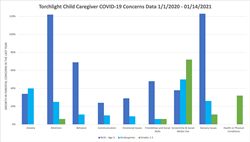
Growth in Parental Concerns
It has been a traumatic year for children. Not only did their social lives and educational experiences change, but what they once understood as safe was ripped away from them in an instant. It’s no wonder we’re seeing increases in anxiety, depression, and even self-harm.
WOODLAND HILLS, Calif. (PRWEB)
March 29, 2021
Torchlight, a leading provider of employee caregiver support solutions, today announced the results of a year-long report that examines the mental health, physical health, development, and special education challenges that children of U.S. employees have faced during COVID-19. The report found that children from birth to age ten have been impacted negatively with double and triple digit rises across multiple areas, including attention, anxiety, sensory, developmental milestones, behavior, social, communication, special needs, and self-harm. The multi-phased report spans from January 1, 2020 through January 15, 2021.
The time period of the data capture compares the baseline of parental concerns before the pandemic with a full year of living under socially and physically distanced conditions. Parents with children birth to age three have reported dramatic decreases in attention span (122%), increases in sensory issues (123%), and increased challenges with social skills (48%) since the pandemic. Working parents also reported a spike in concerns with their young children’s anxiety (34%), mood (29%) and communication challenges (24%). Comparatively, first through fifth grade children had the largest increase in developmental issues (262%). This increase for elementary school age children is more than 10 times that of preschool children (23%). Also troubling, parents reported a 34% increase in concerns with self-harm for this age group, and a 32% increase in physical health concerns.
“It has been a traumatic year for children. Not only did their social lives and educational experiences change, but what they once understood as safe – seeing friends, hugging family members – was ripped away from them in an instant. It’s no wonder we’re seeing increases in anxiety, depression, and even self-harm,” said Gena Rotas, LICSW, a clinical social worker, specializing in working with children and families, and serving as one of the experts for Torchlight’s caregiver support platform.
“What people may not realize is that the loss for children goes beyond an emotional and an academic one. Children have lost a tremendous amount of soft skills this year, from how to socialize and make eye contact to how to sit still for hours in a structured setting. As schools begin to fully re-open now, parents and educators cannot expect to simply pick up where they left off a year ago.”
According to the CDC, nearly half of all adults in the U.S. have also reported at least one adverse mental or behavioral health condition, including symptoms of anxiety and depression (30.9%), trauma- and stressor-related disorder (26.3%), and increased substance use (13.3%) since the start of the pandemic a year ago. Parents of young children, especially, have been challenged in the last year to balance their own mental health struggles, as well as their children’s. According to the Family Caregiver Alliance, 39% of employees have left their jobs due to caregiver responsibilities, and women with children under ten are leaving the workforce more than any other cohort during the pandemic McKinsey & Company’s sixth annual Women in the Workplace study found.
“There is a delicate and integral relationship between an employer, an employee, and an employee’s child. When just one cog in the proverbial wheel shifts, the other two parties are impacted,” said Adam Goldberg, CEO of Torchlight. “The seismic shift imposed by the pandemic requires employers to pivot with urgency to meet the ever-evolving needs of their workforce, which in large part includes parents. This lack of agility on the employers’ part is one of the reasons that more than a third of employee caregivers are leaving their jobs.”
Additional key findings from Torchlight’s study:
● Kindergarten aged children saw the sharpest rise in anxiety (40%) among young children.
● Rises in difficulties with social skills (31%), sensory issues (26%), attention (25%), IEPs (24%) and organization (23%) also were noted by parents.
● Elementary school parents also reported an increase in concerns regarding organization (49%).
Methodology
Torchlight’s year-long study on parental concerns regarding young children’s mental health and development is an aggregation of data analytics representing 3,839 employed U.S. caregivers of children, a subset of Torchlight’s total user population. Data from real-time employed parents and family caregiver interactions within the Torchlight platform yield concern indicators comparing pre-COVID-19 levels with those found in subsequent, comparable 75-day timeframes. Pre-COVID-19 is defined as January 1, 2020 – March 15, 2020; Phase one from March 16, 2020 – May 31, 2020; Phase two from June 1, 2020 – August 15, 2020; Phase Three from August 16, 2020 – November 30, 2020, Phase four from December 1, 2020 – January 15, 2021.
About Torchlight
At Torchlight, we believe that caring is everyone’s business and caring is good business. We are the only complete caregiver support solution for employers and member organizations. We offer solutions informed by data and, thus, are built for better results. Our approach includes a user-friendly digital platform and a team of expert advisors. No matter the age, stage or concern, Torchlight’s decision-support tools, caregiving knowledge base, and human expertise combine to reduce stress and enhance outcomes for both families and their sponsoring organizations more cost-effectively than call center or concierge-only solutions. Because getting caregivers the right resources, in the right ways, right from the beginning should be business as usual. Learn more at http://www.torchlight.care, or email press@torchlight.care.
Share article on social media or email:

